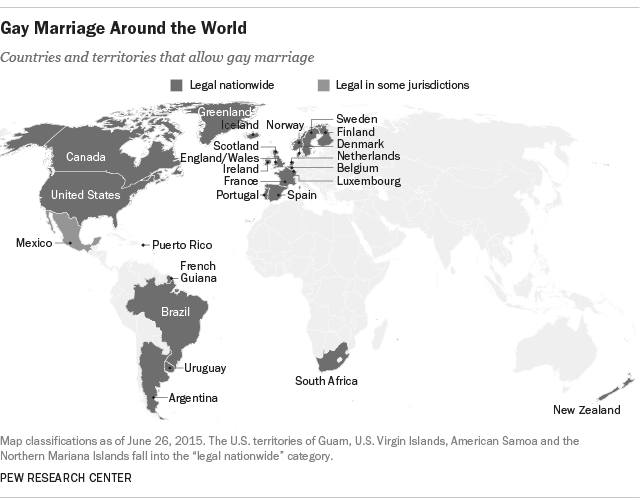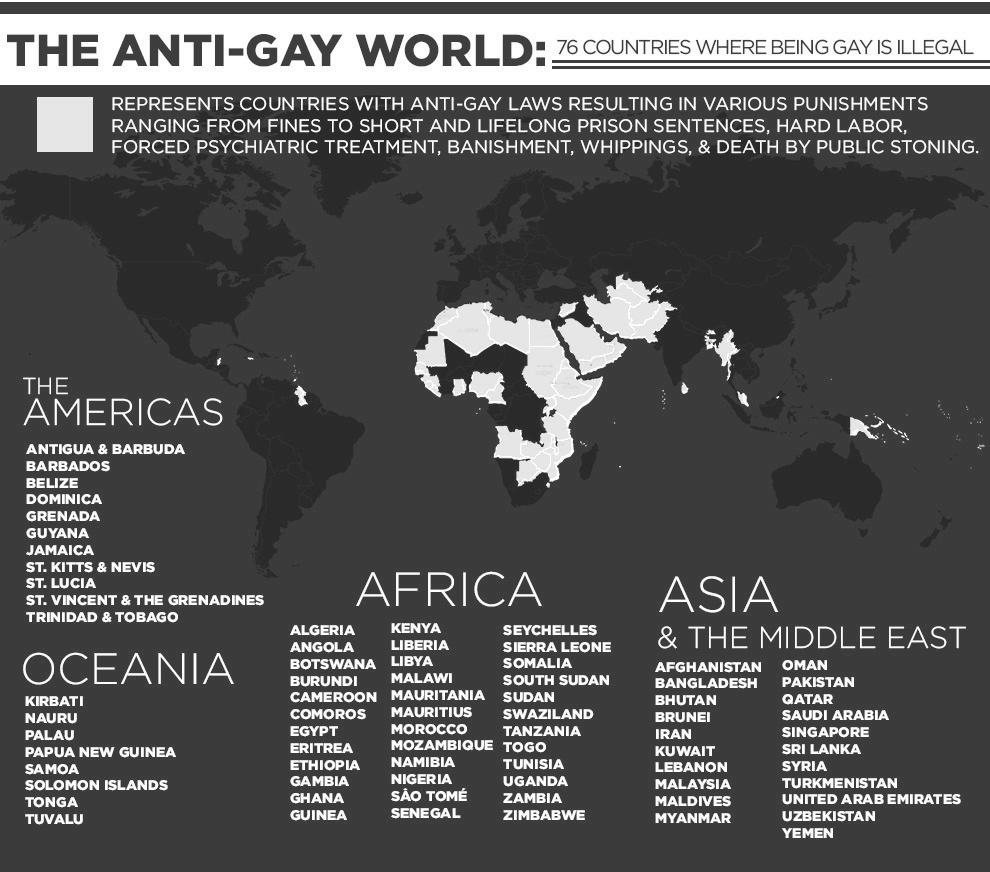Introduction
On June 27-28, 2015, a Gay Pride festival took place in San Francisco. The festival was aimed to remind the public of the long history of oppression against LGBT people and the struggle against it, to celebrate the freedoms which were gained as the result of this struggle, and to further promote tolerant attitude towards gay people (Equality without exception). The festival also occurred to celebrate the legalization of same-sex marriage in all the United States by the Supreme Court (Roberts & Siddiqui, 2015). Today, gay marriage is becoming legal not only in America, though, but in many other countries across the world. It is a tendency which, as we will see, brings benefits to both individual persons and society as a whole.
History and Background of Same-Sex Marriage
Half a century ago, same-sex marriage, as a legal phenomenon, didn’t exist anywhere in the world (Newton, 2010, p. 87). Moreover, sexual relationships between people of the same sex were considered a felony in many countries, including the USA (Klarman, 2013, para. 1). Stonewall Riots, a rebellion against police raids in New York in 1969, are considered the beginning of the gay rights movement in America (Same-sex marriage around the world, 2012).
The first country in the world to “provide same-sex couples with marriage-like privileges”, though, was Holland, where the so-called “unregistered cohabitation” was allowed in 1979 (Newton, 2010, p. 87). Other European countries also started to adopt laws that gave similar rights to LGBT; Denmark, for instance, allowed “registered partnerships” in 1989, Sweden–in 1994, Norway–in 1993, Belgium–in 1999 (Newton, 2010, p. 88). In December 2000, the first law in the world that legalized same-sex marriage was adopted in Holland (Newton, 2010, p. 87). In the USA, same-sex marriage was first recognized in Massachusetts in 2003 (Klarman, 2013). Gradually, gay marriage gathered more support and was legalized in some other countries. In 2015, it became legal across all the USA (Roberts & Siddiqui, 2015).
Today, same-sex marriage is legal in 22 countries, mostly in Europe and both Americas, and in some jurisdictions in Mexico (Gay marriage around the world, 2015). See Fig. 1.

On the other hand, there are still more than 75 countries where LGBT are criminalized, and in some of them, the punishment for being gay is death (Jones, 2013). See Fig. 2.

Therefore, despite the positive tendency of recognizing gay people, the struggle for equality remains an important problem in today’s world.
Why Is Same-Sex Marriage Opposed?
Opponents of same-sex marriage offer various objections against its legalization. According to most common of them, homosexuality is immoral, it offends people’s gods; gay marriages promote “homosexual lifestyle” (this concept is quite vague, though) and impose acceptance of gays on all the society (10 reasons why homosexual “marriage” is harmful and must be opposed, n.d.). Another objection is that marriage is, by definition, a “covenant between a man and a woman… by its nature ordered toward the procreation and education of children”, and thus, same-sex marriage, a marriage between two people of the same sex, is not “real marriage” (10 reasons why homosexual “marriage” is harmful and must be opposed, n.d., para. 2-3).
It is also stated that same-sex marriage undermines the very institution of matrimony (Cline, n.d.b). Cline (n.d.b), though, argues that this objection is based on religious views and that it appears no valid secular arguments are supporting this claim (par. 6).
Objections related to fertility are most commonly used. As homosexual couples cannot produce babies on their own, it is claimed that the only way for them to have children is adoption. But such adoption is asserted to be harmful, e.g. because of children’s “hunger for their biological parents” and need both a mother and a father (Ten arguments from social science against same-sex marriage, n.d.). Joslin (2011), though, argues that this harmfulness is a fiction.
Moreover, proponents of this opinion appear to overlook the fact that adopted children, as a rule, did not live with their biological parents before adoption, and that LGBT-families offer more attention and care than orphanages. Besides, it is possible e.g. for a male and a female homosexual couple to produce children by using in vitro fertilization and to raise them together.
Why Should Same-Sex Marriage Be Supported?
There are various reasons why same-sex marriage should be supported. One of them is that in a democratic society, a concrete individual should be respected. The crux of democracy is equality. Equality also entails diversity. Equality means that individual’s needs should be of primal importance, for if the needs of a concrete individual are neglected for the sake of some social groups, or the sake of (often imaginary) “needs of society/race/nation”, it only turns the society into authoritarian one, where discrimination flourishes and particular social groups dominate over others. Thus, discrimination should be fought, which means that any differences in rights and social opportunities of heterosexual and LGBT people should be demolished. Introducing the right to same-sex marriage is important for this.
Another argument for gay marriage involves the government’s role. In a democratic society, any governance must be performed for the sake of people, not vice versa. It means that the government should protect freedom and the rights of each person and that a person’s private life should not be the government’s concern. (Same-sex) marriage is an agreement between two adult people who consciously agree to live together and accept certain responsibilities. Therefore, the government is obliged to protect their free choice and provide them with conditions that would enable them to realize that choice, regardless of the people’s sex, sexual orientation, or any other characteristics.
It is also worth saying that gay people should have the same rights as others according to the conception of human rights, for human rights are “inherent to all human beings, whatever our nationality, place of residence, sex, national or ethnic origin, color, religion, language, or any other status”, they are “universal and inalienable” (What are human rights? n.d.). This entails the right to marry any person of one’s choice, regardless of their sex.
And, finally, it is estimated that same-sex marriages benefit both gay people and the whole society. Same-sex marriage means public acceptance, which reduces minority stress, social, and self-stigmatization; it also provides gay couples with better access to health care (Buffie, 2011). Cline (n.d.a) argues that same-sex marriage supplies gay people with legal rights to support each other in difficult situations positively affects the institute of marriage by “providing more positive role models”, and integrates gay couples into society, thus stabilizing the society in general. Buffie (2011) points out that “as a result of the legal recognition of same-sex marriage, 72% felt more committed to their partners” (p. 987), which also possibly means reducing the level of promiscuity among LGBT and, consequently, lowering the number of transmissions of sexually transmitted diseases in this social group.
Conclusion
As we have seen, legalizing same-sex marriage is a tendency in today’s world which is beneficial for both individuals and society as a whole. On the other hand, gay people remain criminalized in many countries of the world. Thus, promoting equality and tolerance towards LGBT remains an important concern today.
References
Buffie, W. C. (2011). Public health implications of same-sex marriage. American Journal of Public Health, 101(6), 986-90. Web.
Cline, A. (n.d.a). Arguments for gay marriage: moral and social arguments for gay marriage. Web.
Cline, A. (n.d.b). Gay marriage will undermine the institution of marriage. Therefore, gays shouldn’t marry? Web.
Equality without exception: Frequently asked questions (FAQ). (2015). Web.
Gay marriage around the world. (2015). Web.
Jones, S. (2013). 76 countries where anti-gay laws are as bad as or worse than Russia’s. Web.
Joslin, C. G. (2011). Searching for Harm: Same-Sex Marriage and the Well-Being of Children. Web.
Klarman, M. J. (2013). How same-sex marriage came to be: On activism, litigation, and social change in America. Web.
Newton, D. E. (2010). Same-sex marriage: A reference handbook. Santa Barbara, CA: ABC-CLIO.
Roberts, D., & Siddiqui, S. (2015). Gay marriage declared legal across the US in historic supreme court ruling. Web.
Same-sex marriage around the world. (2012). Web.
Ten arguments from social science against same-sex marriage. (n.d.) Web.
What are human rights? (n.d.) Web.
10 reasons why homosexual “marriage” is harmful and must be opposed. (n.d.). Web.